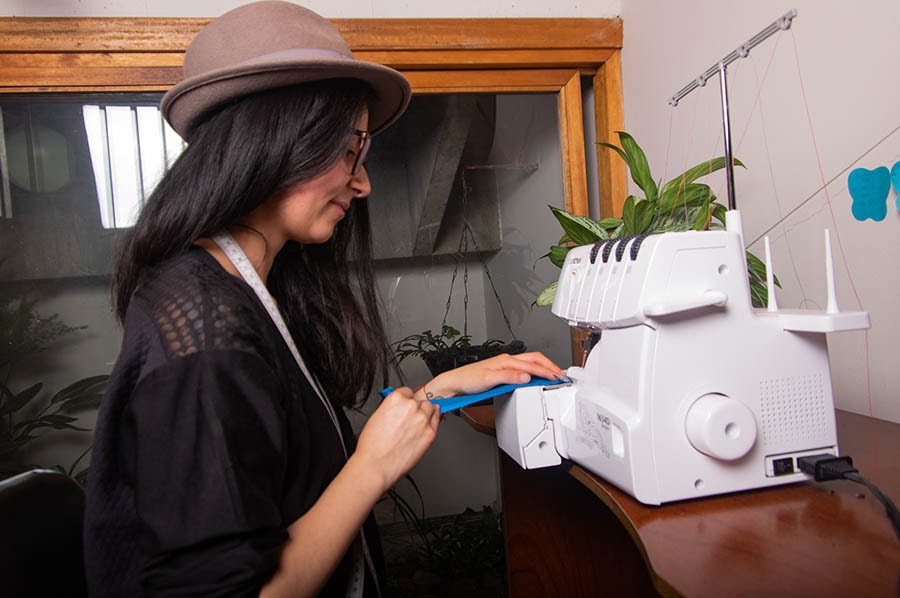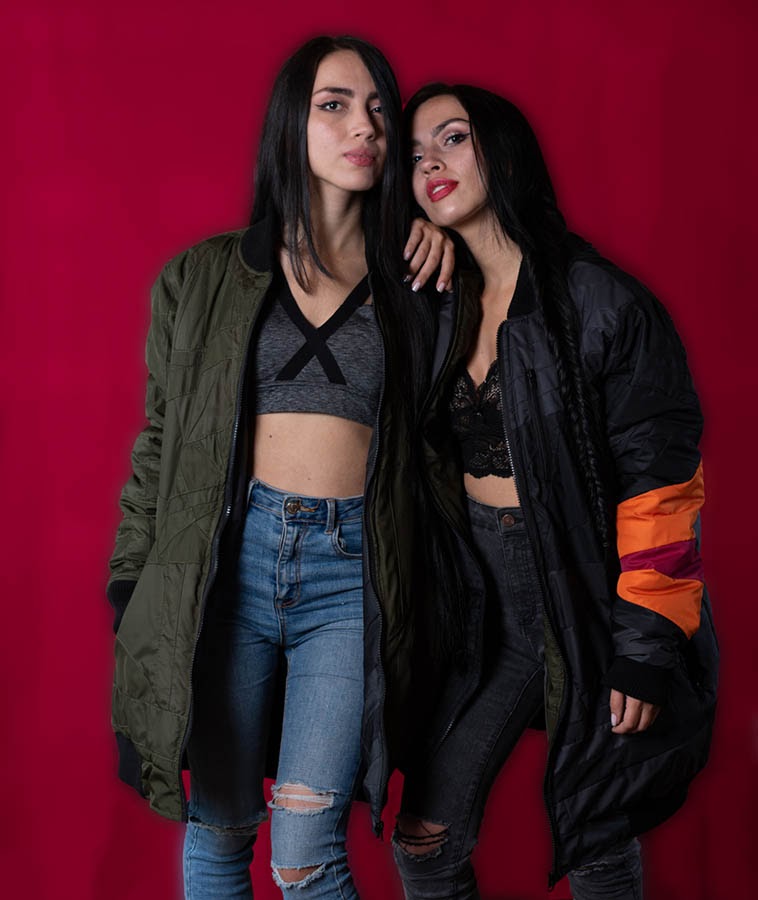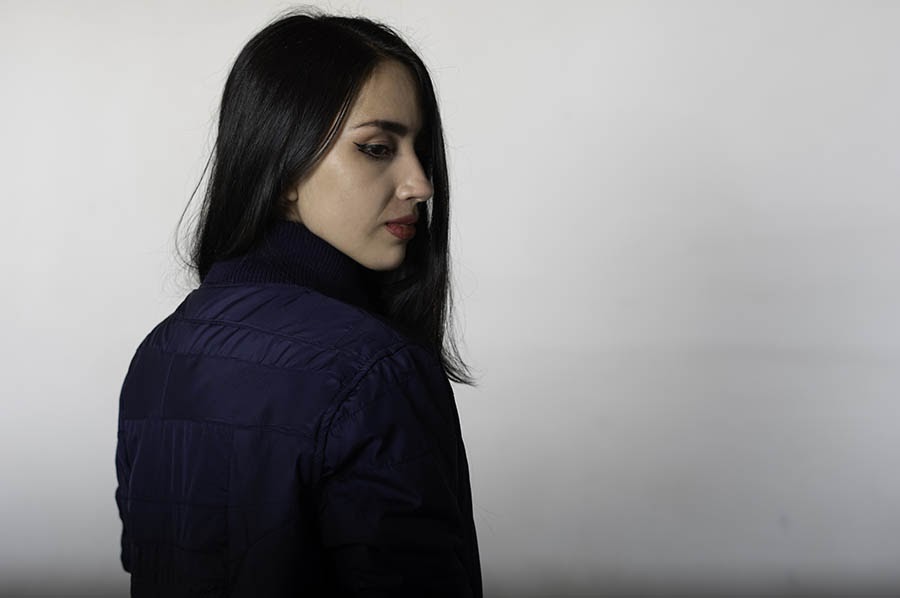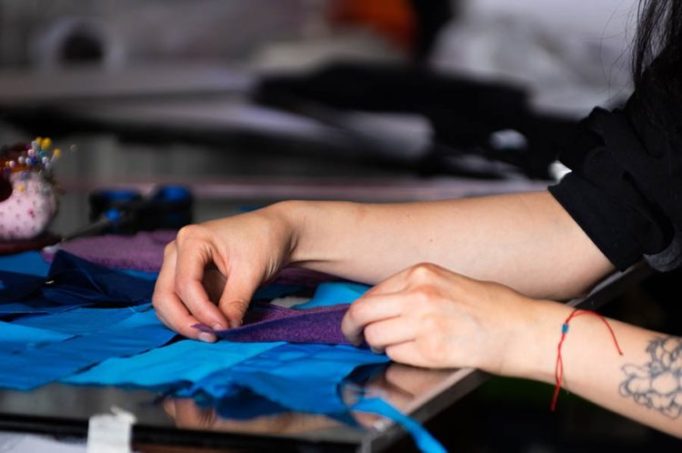The so-called fast-fashion industry — which brings runway fashions to discount stores — means more trendy clothes are produced faster and cheaper. It also means that, when trends change or cheap fabric wears thin, much of that gets thrown away — about 85% of all textiles produced annually end up in the landfill.
The list of the industry’s environmental offenses goes on: Discarded clothing contributes to microplastics polluting the ocean. Creating fast fashion produces more carbon emissions than international flights and maritime shipping combined. It takes 2,000 gallons of water to produce one pair of jeans.
Enough is enough, says Claudia Martinez Puerto.
“Fashion is a part of the life of every single person, and it is one the most contaminating industries in the world,” Martinez says. “One of the problems of the industry is the amount of waste it generates.”
In 2015, Martinez founded Les Common People, a Colombian clothing brand styled as “an indie clothing brand for indie women.” As Martinez became more familiar with the fashion industry — including its notorious waste and, at times, dubious supply chains, riddled with low pay and poor working conditions — she decided to make some changes.
“In 2018 we decided to change the concept of the brand and focus on environmental sustainability and the development of products with textile waste,” Martinez says. Les Common People uses discarded textiles, including waste from clothing manufacturers, to upcycle and stitch together one-of-a-kind garments from jackets to pants. And all the stitching is done by in-country locals, giving Les Common People control over the working conditions.
Martinez has relied on DreamHost to support her entrance into the world of e-commerce — and her goal of a more sustainable future. “By upcycling, we can begin to be part of the change that humanity is looking for: people who care about the environmental and social impact it generates,” she says.

We’ll Support Your Dream
Whatever your online goals, DreamHost will be right there with you, making sure your site is fast, secure, and always up. Plans start at $2.59/mo.
Choose Your PlanStyle and Sustainability
Martinez was born and raised in Bogota, Colombia, and today runs Les Common People in her hometown.
“This country is full of inspiration,” she says. “Its landscapes are like no other; its people are quite unique and even though Bogota is kind of a messy city, it has some really beautiful places and you can find all kinds of things.”
Martinez began her career as a freelance advertiser, designing and sewing her own clothes as a hobby, before building Les Common People. She works with other collaborators to help with photography, design, and accounting.
“I wanted people to feel in clothes the way I did with the clothes that I made for myself. That was the moment I decided to start my own fashion brand,” she says.

Today, she designs and even sews some of the clothing for Les Common People, drawing inspiration from art, music, and film. The name of her company, which combines English with her native Spanish, reflects Martinez’s own fashion philosophy and why she wanted to get into the industry in the first place.
“The name of the brand was born from the idea that all human beings are the same and that we communicate who we are through the clothes we wear. We are ‘common people’ full of originality and uniqueness, people who use the garments that we wear as a way to let the world know who we are.”
But expressing your individuality through beautiful and stylish clothing, she says, doesn’t have to destroy the environment.
“In a market full of fast fashion brands, finding unique, authentic and designer garments is an almost impossible task, which is why at Les Common People we decided to create unique garments from upcycling of completely new textile waste,” she says. “We add value to fabrics that were wasted for others; we transform 100% new textile waste into garments.”
This strategy — creating pieces that are not only different from what you find in the store, but that are crafted and designed individually, using available fabric waste to create a look literally found nowhere else — creates a perfect marriage of style and sustainability. And this union results in the opposite of fast fashion: handcrafted, quality garments meant to look great for years.
“By mixing design with sustainability values, we reached the midpoint we were looking for,” Martinez says. “We are offering a product with the style and design of the brand, a product that will help mitigate the environmental problem generated by this industry, and that was developed respecting all the links of our productive chain.”
Supply and Demand
Another of Martinez’s priorities is cleaning up the supply chain. The bargain-priced, trendy clothes lining shelves at many western shops are often made by workers in China, India, and other countries, primarily women and girls, many working long hours in dangerous conditions for as little as 15 cents an hour.
To make sure her clothing is both skillfully and ethically made, Martinez collaborates locally to create her inventory.
“We outsource the manufacturing of the garments to small producers in Bogota, where our brand is located,” she explained. “As a brand with sustainable values, we managed to create designer garments from upcycling. And by producing locally we can manage the work conditions of the people who make all our garments possible.”
The source of her clothing itself is new textile waste — that is, unused fabrics that would have otherwise been discarded into landfills. The raw material dictates what kind of projects Martinez and her collaborators can work on and forces creativity into the design. The result is a one-of-a-kind patchwork look in her clothing that mixes complementary patterns and textures.
“By taking the waste of others, we have the possibility of developing our creativity through the different shapes, textures, reliefs, and designs that the textile waste gives us, and with this create a unique garment,” Martinez says.
The waste fabric also impacts the lineup in the inventory. Right now in the Les Common People shop, you’ll find jackets and pullovers for sale — because they built the collection based on the materials that were available at the moment.
Martinez and her team are currently busy producing their next collection, which will feature shirts and pants designed to pair well with the outerwear. In addition to sustainable production and supply chain, Martinez’s products stand out for their design.
“Our products are recognized as a garment with style and design, which is appreciated for its originality as well as being an easy garment to integrate into our clients’ closet.”
Challenges and Triumphs
Owning and running a small business suits her, says Martinez — even with the long hours it demands of her.
“I like the independence that having your own business gives you — having control of your own time and working the way you like to,” she says. “Even though you may think that working by yourself is going to be a more relaxed job, it isn’t. Sometimes you have to work 10 times more, but it is really gratifying when you see the results of working on your own project.”

The workload was a challenge, especially in the early days of Les Common People, but bringing in outside help allowed Martinez to hone her strengths. She learned to let go of the details and keep her eyes on the big picture.
“When you have a small business usually you do almost everything by yourself and that is not an easy task,” she says. “For me, it was hard to let people in and get help to do things. I thought that I could do everything by myself, and I was so wrong. Even though I wanted to do everything and have control of every little process so everything gets done the best way possible, it was impossible and I was draining myself. Now that I have some collaborators, I can focus on the design and management — the things that I am good at.”
Martinez has been able to build Les Common People into a full-time job for the past few years. “I love what I have achieved,” she says. Now she’s looking forward to continuing to grow the business and building a bigger team.
Of course, Martinez’s background in advertising has been an asset, “with all the communication of the brand and how to work with inspiration boards and get ideas to reality,” she says.
And customers have really connected with the brand, Martinez says. They feel they can really get behind the social mission of her clothing label — and the style and design don’t hurt either. They especially recognize each piece for the time that it takes to create by hand — the oversized bomber jacket in the Les Common People collection, for example, requires more than 10 hours of sewing to construct.
“People love how original and innovative our products are and how easy they can mix it with all kinds of garments,” she says. “The social and environmental core of our brand are also really appreciated by our customers, who are looking for ways to make a good impact on the world, and they find that in our brand.”
Related: Building Your Own Business Website? Don’t Make These 10 Mistakes
Spreading the Word
Les Common People is an online e-commerce store without a brick-and-mortar location. Fairs and other live events put the clothing in front of buyers, so they can see and experience them in person. Otherwise, the brand relies on connecting with potential customers online and through social media.
“We love to hear what our customers have to say about our brand and products,” she says. “Through social media, we connect to our clients and possible clients, and on our website, they can find all the products so it is really easy to get from Instagram to our site, for example.”
Related: 10 Easy Social Media Tips for Your Hard-Working Small Business
Les Common People’s website is simple and to the point, and the homepage goes directly to their shop — a choice Martinez made purposefully.
“What we love about our website is that it is really clean so clients can focus on our products,” she says. “Even though it is a basic site, it is really easy to navigate and to get in contact with us if our clients want to. The main thing we want our clients to find is our products and that is the first thing they see when they get in.”
She recognizes that there’s room in the future to develop the site more and use it as a space to tell more of the company’s story, but for now, it is focused on showcasing their products to the world.

Martinez used WordPress, hosted by DreamHost, to build her website. This power combo, she says, helped her make a smooth entry into building an e-commerce business that relies so much on its website for sales.
“DreamHost has a very user-friendly dashboard, is easy to use, the support forum is very complete, and the customer service is excellent,” she says. “The WordPress hosting plan really helped me to build, develop, and manage my website.”
Changing Our Clothes, Changing the World
For now, Les Common People ships only within Colombia. Shipping costs outside of the country are high, and as a small brand, they are focusing on local growth for now. They do have plans to ship worldwide in the future.
To benefit her work with Les Common People — and for pure personal enjoyment — Martinez is studying artisanal dyeing techniques, such as marbled fabric and dyeing textiles with natural pigments. “I really enjoy learning new things that I can use for my personal and professional life,” she says.
She also is always on the lookout for new ways to support her brand’s mission of sustainability in fashion.
“We want to keep creating unique garments made of upcycled fabrics, to learn new techniques to keep hundreds of kilos of new fabric out of the landfill, and to continue our path into sustainability not only with the brand but with our life as well,” Martinez says.
With these changes in hers and other brands and a growing awareness of the environmental toll of fast fashion, Martinez is optimistic about the future of fashion — and hopes that her customers and others will make responsible choices about what clothing they purchase and wear.
“We all can be part of the change and dress without affecting the planet and its inhabitants,” she says. “The world is changing; the way we dress should too.”
